From the Front Lines of Libya
American photojournalist Lynsey Addario survived six days of hell while being held captive in Libya. Now she shares how she coped, what's next, and why it matters for women.
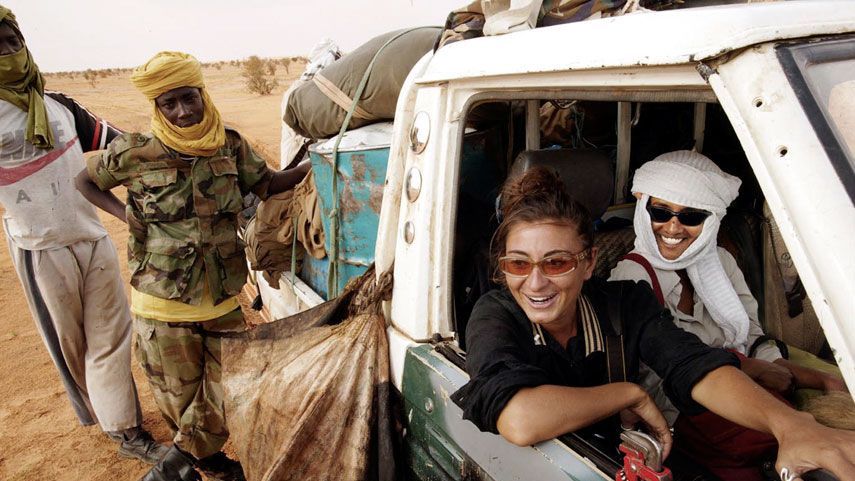
Lynsey Addario stands in front of a roomful of journalists at the Mandarin Oriental in New York City. She has just received an award from the Overseas Press Club for her photojournalism, and she's having a hard time getting through her acceptance speech. Two of her friends and fellow photographers, Tim Hetherington and Chris Hondros, were killed a week earlier during a mortar attack in Libya. The moment Addario says their names, her face crumples, and she begins to cry.
Addario barely got out of Libya alive herself. Held captive for six days in March, she and three other journalists, on assignment for The New York Times, endured intense physical and psychological abuse. The ordeal began when Libyan soldiers detained the journalists at a checkpoint near a rebel-held town of Ajdabiya, beating them, forcing them to their knees, and ordering them to lie facedown on the ground — to be shot. The journalists' lives were spared that day, but the week that followed brought beatings, sexual aggression, and threats of murder. Bound and often blindfolded, they were moved from truck to truck, before finally getting released amid international pressure.
Addario, a 37-year-old Connecticut native, certainly knows the risks of her profession: For the past 15 years, she has traveled the world covering conflict and women's issues for publications such as National Geographic, Time, and Newsweek, in addition to the Times. In 2004, she was held captive by gunmen for eight hours in Iraq. In 2009, while on assignment in Pakistan, her collarbone was broken in a car accident when the driver fell asleep at the wheel, killing himself in the process. We talked to Addario as well as her husband, Paul de Bendern, a Reuters bureau chief in New Delhi, India, where the couple is currently based, about how they got through the latest ordeal — and what drives them to report from war zones.
Lynsey, you were lying facedown on the ground with your colleagues when you heard a Libyan soldier say: "Shoot them." What goes through your mind when you think you will be killed?
Lynsey Addario: For me, I just pray. And I'm not very religious at all — I was raised Catholic, but probably haven't gone to church since my Holy Communion, when I was about 6 or 7. I think that there's nothing you can do when you're in that situation, so for me, I go into this sort of altered state, almost begging: Please. Please. Please. You can't do anything. You really can't. So you just hope that they don't kill you.
During your captivity, soldiers were alternately groping your breasts and punching you in the face. At one point, a soldier caressed your head while threatening to kill you. How did you keep your sanity?
Lynsey: I was lucky because there were four of us. We were together, and that really helped tremendously in terms of dealing with things along the way. There were many times when we weren't allowed to speak to each other, but just the fact that we knew the other people were present was a big help. When we could talk, we said just a few words like, "We'll get through this. You have people at home who love you. Don't worry, we'll be fine." We constantly were reassuring ourselves, and each other.
Stay In The Know
Get exclusive access to fashion and beauty trends, hot-off-the-press celebrity news, and more.
Did you think, If I get out of here alive, there's something I must do — or did you think, I just need to get out of here alive?
Lynsey: I was thinking I need to get out of here alive. I was also thinking, Maybe it's time to get pregnant. I was thinking I've had a lot of close calls, and maybe this is a sign.
Paul, what did you do when you heard Lynsey had been captured? How do you keep your thoughts from going to the darkest place?
Paul de Bendern: I've been a journalist for Reuters for about 16 years, living in North Africa, Latin America, Europe, and now in Asia. So I've been in difficult situations and have had to make decisions about reporters in harm's way. But of course it's a very different thing when it's the person you love most in the world. The first moment you realize something is wrong, everything goes through your mind: What happens now? Am I ever going to see her again? There's a series of worst-case scenarios. The first night I had quite a few whiskeys, but that didn't really help. Then it was continuous calls — to the Times, to colleagues on the ground in Libya. I tried to keep my mind busy. I focused on getting her home. I tried to keep it together — it doesn't help to break down and completely become a basket case. After 24 hours, when no bodies had been found, I knew it was likely that they were alive. Most likely the government had taken them, because the it wasn't in the rebels' interest. But this was not confirmed for several days, and it felt like years.
Lynsey, when soldiers were groping you, you knew not to fight back, but to plead for mercy. How did you know to do that?
Lynsey: I've worked for over 11 years in the Muslim world, and the one thing that I feel like I've learned — who's to say if it's true or not true, it's just my experience — is that men don't like to see really strong, aggressive women in that area of the world. So I think that when I elicited the most sympathy, and when they did in fact stop, was when I was crying and pleading. I didn't even try and scream and kick, because that's never worked for me in that part of the world. Also I know that it's against Islam to touch another man's wife, so if I said, "Look, I have a husband. You are Muslim," those are things that I felt would garner more sympathy and support to leave me alone.
Your instincts might have helped keep you alive.
Lynsey: I don't know; I think a lot of it also is luck. At the end of the day, the fact that we weren't killed in the crossfire in the first 15 minutes or the first eight hours when they just held us on the front lines, tied up, it's pretty miraculous that none of us were killed.
Paul, at one point you went on CNN to appeal to the Qaddafi regime.
Paul: Yes, you have to be careful what you say publicly, but a friend of mine at CNN said, "Look, the Qaddafi regime is weird and unpredictable, but they care about America and this kind of stuff — if you do a personal appeal, it can be very powerful." It was very difficult to do and very emotional. I didn't know if I could deal with it.
Paul, you met Lynsey in Tunisia after her release. What was it like to be reunited?
Paul: I met her at the airport in Tunis. No one realized how bad it had been — the Times had warned me that they had suffered beatings and gropings, but we didn't know yet the full extent of it. When I saw her, I ran up to her, kissed her and hugged her. It was very emotional. But I think both of us were kind of in a state of shock. It wasn't like a complete breakdown when we saw each other. It's not like the movies, where it's all dramatic. We went to the hotel that night and got champagne and sat on the balcony, and rested. Over the days and weeks it's something we digested. I think we still are.
Lynsey, when you were freed, the blogosphere started buzzing with comments about how women shouldn't be covering war — and the Times shouldn't have sent you there.
Lynsey: Mortars and artillery don't discriminate against gender. We all saw what happened to Tim and Chris. Journalists dedicate their lives to covering war — they make many personal sacrifices, and it's not something that's gender-based. In a place like Libya where there's heavy fighting, it doesn't matter if you're a man or a woman.
But there are stories where gender makes a difference, in a good way…
Lynsey: Absolutely, for example when I'm working on women's stories in a Muslim country. In a place like Afghanistan where the society is completely segregated, women have access to women. Men cannot always photograph women and cannot get the access that I get.
Paul: When you hear that women shouldn't cover this or that, it's a joke. When you look at some of the stories Lynsey has covered — maternal mortality in Sierra Leone, burn victims in Afghanistan — do you think a guy who's a macho photojournalist is gonna make that happen? No. It is very important that these stories are communicated. And reporting these stories, this is not easy stuff. Lynsey is helping people understand that.
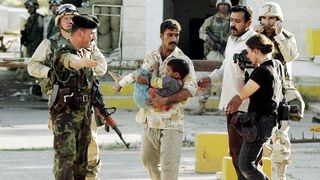
CBS News correspondent Lara Logan, who was sexually assaulted by a mob of men in Cairo earlier this year, has said that when she heard about your ordeal, Lynsey, it was a setback in her recovery.
Lynsey: I read that and it upset me. But I understand. I felt like that myself when I heard about Tim and Chris — that was a huge setback for me. It just shows how vulnerable we all are and how, like the people we cover, our lives are at risk all the time. I think I'm strong, and I think I've processed a lot of what happened in Libya, but there certainly is a lot of residual trauma. It has been a rough year for journalists. Joao Silva lost his legs when he stepped on a landmine in Afghanistan; others have been detained. When our friends were killed last week, it just set me reeling. I basically couldn't really do anything for the past week. They were friends and colleagues and people that I've shared a lot of experiences with over the years. It's devastating on many levels. It's a loss for everyone.
Are you getting any therapy to help with the fallout from your experience in Libya?
Lynsey: The Times has been great — they have someone that speaks to their correspondents after they've suffered some sort of trauma. For me, I have gotten a few names of people who deal with PTSD, and I will speak to someone. I do think it's important to deal with something like this and not let it linger too long.
Reporters get conflict training, but not sexual-assault training. Now the Committee to Protect Journalists is adding sexual-assault guidelines to its handbook. Will that help?
Lynsey: I don't think there is a right answer. There are ways to minimize the risk if you are a woman working in the Middle East: You can dress modestly, wear the hijab, cover your head, always travel with a man. But a woman can get assaulted in Washington D.C. These things happen around the world and they happen in the U.S. There are things you can do to decrease the risk, but there are things you just take in stride as part of the job.
Women often don't report sexual assault, for fear of losing an assignment...
Lynsey: A lot of women reporters are scared of coming forward. And I'm not gonna complain every time a guy grabs my butt. I'm just not gonna do it. My editors are never gonna send me anywhere if I do that. That's a concern, of course, that we all have. If women are all of a sudden complaining all the time about getting sent to Pakistan, then if I were an editor, I probably wouldn't send a woman either.
So unless it's a major assault, like what happened to Lara Logan, women aren't talking about it.
Lynsey: Right. What happened to Lara Logan is the extreme. It's horrible and it's extremely traumatic. I'm very glad that she came forward because I think it was very brave of her to do so. There are benefits to her coming forward — other women will in fact come forward now. But she said in her interview with the Times that she didn't want this to define her as a journalist. I understand that. She has a large body of work behind her, and it shouldn't be the only thing people remember her by. But it will take time.
You were held captive by gunmen in Fallujah, Iraq, seven years ago ...
Lynsey: It was only for about eight hours, and in Iraq at that time, a lot of people were getting kidnapped. It was very dramatic and terrifying, but it didn't compare to the six days we spent in Libya.
How did you become a war photographer?
Lynsey: When I graduated from college, in 1995, I moved to Argentina because I wanted to learn Spanish. I had already lived in Europe — I studied abroad in Italy my junior year — so I picked Latin America. When I got there, I ended up wanting to go to a newspaper to try photography. I basically pushed and pushed, till finally they got so annoyed with me, they gave me an opportunity: They said if I could get access to Madonna filming Evita, they would give me a job. I ended up talking my way on to the set. Once I started photographing in Argentina, after the Dirty War in Latin America, there was a lot of sadness and residual effects of the war. I found it very important to cover that. After that, I freelanced for the Associated Press for three years in New York; I had to prove myself, and I had a wonderful mentor who basically walked me through everything. Once I learned how to do it, I moved to India to try to work overseas. I emailed some freelance clients like The Boston Globe and The Christian Science Monitor, they said yeah, we can use you.
A few years later, you got yourself to Afghanistan…
Lynsey: Yes, when I read about women living under the Taliban, I really wanted to travel there and see for myself: Is it that bad? What is the situation? I remember the night before I left for my trip, I called my mom and said, "I'm going to Afghanistan tomorrow." My parents are hairdressers in Connecticut. Before I became a journalist, they didn't really read the newspapers so much. So she was like, "OK honey, have a good time!" She had no idea, you know? It was very funny. She had basically no concept of where I was going and the dangers I was about to face. At that time in Afghanistan, photography of any living thing was illegal. Once my mom realized where I had gone, she was like, What the fuck!
Photography was illegal in Afghanistan, but you brought your camera anyway?
Lynsey: I did. Having a camera at that time was very terrifying. If the Taliban saw you with a camera, they would stop you. On that first trip, I was able to work for about a week with the UN and with a landmine organization. We drove through the provinces and I took photos, but I had to be very fast and sneak around. After that, I was assigned a Taliban "minder" who followed me everywhere. But he couldn't follow me into homes where there were women, so I took photos inside people's homes.
Where did you get the nerve?
Lynsey: I've always been interested in the rest of the world. My family is very eccentric; my parents have always been very supportive of travel and doing whatever I thought I needed to do. I'm incredibly focused. I think it's a blessing and a curse. I'm so driven that nothing else can stand in my way. For many years, I didn't have a personal life.
You and Paul met in Turkey and have been married for two years. He obviously understands your work, but what about the rest of your family?
Lynsey: I think they do now. It took several years for them to understand the impact of the work I do and why I do it. But they very quickly got invested in journalism when they started seeing that I was publishing in The New York Times and all these places. Now they always follow my stories. What's difficult is the strain we put on our loved ones in this job. At times I feel like it's a very selfish profession, even though our goal is to be selfless, to help other people by telling their stories. But for the people who love us it's very difficult. I know that after Fallujah my parents were falling apart, and the same thing happened after Libya. It's hard to do that, to put that sort of strain on my family. I hope that my work helps people — that's the thing that drives me and keeps me going.
Are you itching to go back out there and start photographing again?
Lynsey: I'm sort of itching, not to get back to Libya, but to get back to work. I don't think I'm gonna go right back into combat now. I'll just take more mellow assignments for the time being. I'll just see when I feel ready.
Abigail Pesta is an award-winning investigative journalist who writes for major publications around the world. She is the author of The Girls: An All-American Town, a Predatory Doctor, and the Untold Story of the Gymnasts Who Brought Him Down.
-
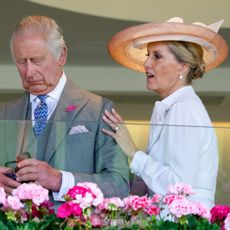 Why Duchess Sophie Allegedly Feels "Snubbed" by King Charles
Why Duchess Sophie Allegedly Feels "Snubbed" by King Charles"There should be an opportunity for Sophie to be allowed to do more," a royal expert claimed.
By Amy Mackelden Published
-
 Dua Lipa Swaps Her Valentino Dress for a Marni Mini Skirt
Dua Lipa Swaps Her Valentino Dress for a Marni Mini SkirtThe singer accessorized her outfits with more than $120,000 of jewelry.
By Amy Mackelden Published
-
 Harry Was Allegedly Crushed When William Received "Special Treatment"
Harry Was Allegedly Crushed When William Received "Special Treatment""Poor Harry's face across the table," Princess Diana's former butler recalled.
By Amy Mackelden Published
-
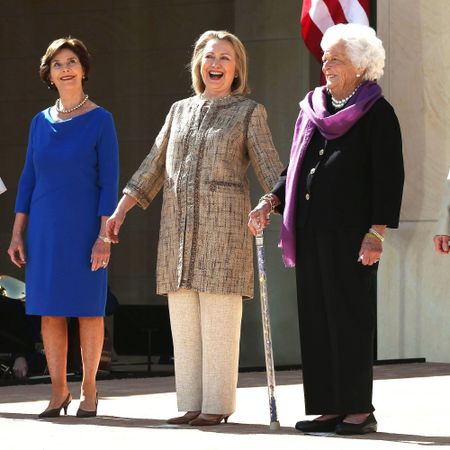 41 Surprising Rules First Ladies Have to Follow
41 Surprising Rules First Ladies Have to Follow...Like not being allowed to drive!
By Jamie Ballard Published
-
 The 20 Best Political Podcasts to Prepare You for the 2020 Election
The 20 Best Political Podcasts to Prepare You for the 2020 ElectionThese podcasts have our vote.
By Alexis Jones Published
-
 Barbara Boxer's New Podcast 'Fight Back' Is a Must-Listen
Barbara Boxer's New Podcast 'Fight Back' Is a Must-ListenThe badass former senator isn't spending retirement relaxing. She's teamed up with her equally badass daughter, Nicole, to record a weekly rallying cry for American women.
By Danielle McNally Published
-
 Natalie Portman Knew Jared Kushner at Harvard and Says He's a "Super Villain"
Natalie Portman Knew Jared Kushner at Harvard and Says He's a "Super Villain"They were friendly in college.
By Cady Drell Published
-
 So, the GOP Website Published Trump's Fake News Awards
So, the GOP Website Published Trump's Fake News AwardsAnd the internet is losing it.
By Alex Warner Published
-
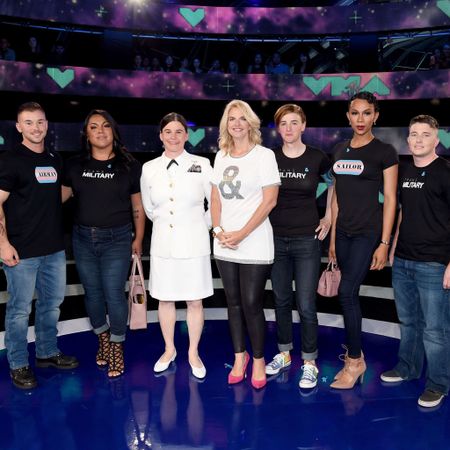 Transgender Military Members Just Made a Major Statement at the VMAs
Transgender Military Members Just Made a Major Statement at the VMAsMTV invited them after Trump announced his transgender military ban.
By Kate Storey Published
-
 Sean Spicer's Legacy, as Told by Melissa McCarthy's Best Impressions
Sean Spicer's Legacy, as Told by Melissa McCarthy's Best ImpressionsRIP motorized podium and eternal happiness.
By Chloe Metzger Published
-
Women Flooded Twitter with 'Handmaid's Tale' References in Response to the AHCA
"And you thought 'Handmaid's Tale' was just a fictional story."
By Kayleigh Roberts Published